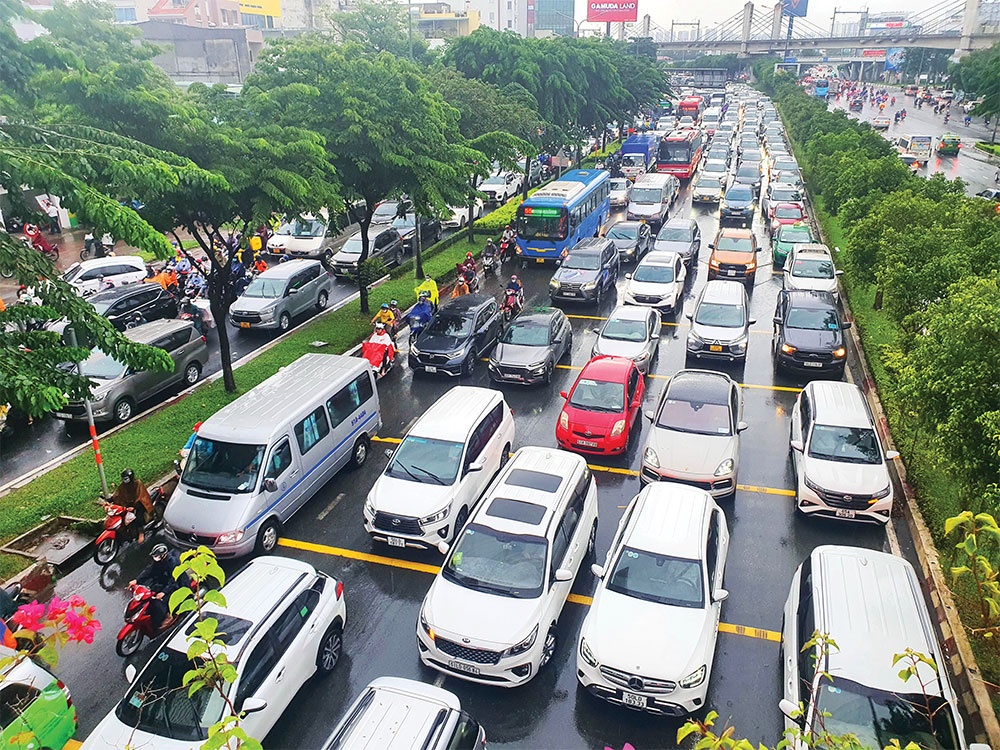Business prospects abound for insurance of car rentals
According to the Vietnam Industry and Trade Information Centre under the Ministry of Industry and Trade (MoIT), Vietnam’s auto industry has seen strong growth in 2022. The car rental market in Vietnam is estimated to reach $550 million this year, with a projected annual growth rate of 10.9 per cent. Instead of spending a large sum on a car to only use occasionally, consumers are choosing to rent cars, either for a single trip or longer terms of around a month.
 |
| Vietnam is trying to catapult its transport infrastructure into the future, and all modes from road to the air are interconnected, Photo Le Toan |
With the rise in prices for petrol, services, and goods, along with the increased demand for personal cars, car rental apps are gaining traction in the market, leading domestic and international startups to launch new services. In the past few years, a series of apps were born to meet these increasing needs, such as BongTrip, Chungxe, Mioto, ExBook, Sigo, Aleka, and TripX.
“Traditional car rental services have been around for years but have only blossomed in the last few years thanks to the emergence of digital car rental applications,” said a representative of the MoIT in a press release. “These car-sharing platforms benefit both parties, the hirer and lessor. Those who rent cars can be more proactive in their journeys by easily picking the right car for their needs among a wide range of models. And car lessors can maximise their income during the cars’ idle time and minimise the financial burden of owning a car.”
Along with this trend, there are certain risks for car owners and renters, including collisions, fires, explosions or theft, creating the need for rental insurance. Several car rental apps have collaborated with insurance companies to launch trip insurance products.
“A recent survey by Ken Research shows that the self-driving car rental market in Vietnam has much potential as the market is still young and fragmented,” said a representative of Global Care Insurtech. “This will be an opportunity for car insurers to help drivers feel more secure while creating revenue.”
Car rental platform Mioto is cooperating with MIC Insurance and PJICO Insurance to launch an insurance product specifically for car-share rentals. This insurance covers vehicle collision, fire, and theft of parts or the whole unit. While renting a car costs about $21 per day, customers can spend about $2 more for insurance.
In cases of unintended collisions leading to car damage, the lessee will only compensate a maximum of $85 for vehicle repair, and the insurer will cover the excess. In April, Zoomcar signed a strategic cooperation agreement with PJICO to provide comprehensive car insurance for car owners and renters in Vietnam, with a compensation package of over $8,000 for loss and damage to vehicles.
Fundamentally, the insurance payment procedures for self-driving rental cars are identical to ordinary car rentals, including taxis. However, according to Do Hong Son, director of Vietnam Insurance Consulting, insurance premiums and deductibles for rental cars may be higher because they form a higher risk category.
“The driver is not familiar with the car, or may even be new to driving, so the risk for the car will be higher,” Son said. “In addition, because there will be many drivers for one car, insurance companies need to be careful in controlling insurance fraud.”
According to the Vietnam Insurance Association, by the end of July, revenue from motor vehicle insurance reached $464.3 million, accounting for 27.5 per cent of total market revenue. Voluntary motor vehicle insurance revenue reached $347.8 million, up 11.4 per cent over the same period.
“Although car rental insurance in this segment currently accounts for a small percentage of sales, the demand for motor vehicle insurance and insurance services for rental cars in particular still has much potential,” Son added.
| Hoang Viet Tien - Head of Strategic Advisory Insider Group
The traditional car rental model has existed for years and has mushroomed in recent years, empowered by the burgeoning presence of diverse technology platforms. These provide a strong impetus to the development of car rental and car-sharing services, empowered by tech apps. According to appraisals from the Industry and Trade Information Centre under the Ministry of Industry and Trade, Vietnam’s auto industry has robust growth potential. Some studies also indicate that Vietnam’s car rental market could reach an estimated $550 million by the end of the year, with a growth pace averaging 10.9 per cent annually. This reflects the tremendous demand for this type of service in the country. Aware of this fertile market segment, a few domestic and foreign startups have raced into this field, thus significantly fuelling the competition. In many cases, a customer can access a car-sharing app, and then reserve a vehicle owned by someone who lives in a suitable location, usually the area in which the customer is visiting. Car-sharing platforms already with a presence in the domestic market include Mioto, Chungxe, and Zoomcar, which have gained growing attention from the public thanks to the diverse advantages they bring. For instance, car rental customers can plan their own journeys and select the type of vehicle that most fits their needs. Meanwhile, owners that offer their vehicles for use can optimise their incomes and reduce financial burdens. However, car owners can also have concerns as there are risks associated with offering cars for rent, such as the prospects of vehicle loss or damage. There remains fairly large untapped space regarding the demand for vehicle insurance, and rental insurance in particular in Vietnam. According to the Vietnam Insurance Association, by the end of July the total revenues of Vietnam’s non-life insurance market came to about $1.68 billion, showing a 14.9 per cent jump on-year. In which, the premium from motorised vehicle insurance reached $464.4 million, accounting for 27.5 per cent, coming second just behind health insurance and up 11.4 per cent on-year. The premium from compulsory liability insurance of motorised vehicle owners came to $116.3 million, making up 6.9 per cent of the total and up 11.4 per cent on-year. Meanwhile, the premium from voluntary liability insurance of motorised vehicle owners amounted to $348 million, up 11.4 per cent on-year. |
 | Insurers show off digital-led products To simplify the purchasing process, insurance companies are in a race to launch new digital products while cooperating with the banking industry and e-commerce platforms. |
 | Insurance companies urged to go digital soon Insurers should promote digital transformation rapidly as, compared to other financial industries, the insurance industry is considered to have slow digital transformation with limited economic efficiency. |
What the stars mean:
★ Poor ★ ★ Promising ★★★ Good ★★★★ Very good ★★★★★ Exceptional
Related Contents
Latest News
More News
- Shinhan Life Vietnam builds growth on people strategy (October 07, 2025 | 09:45)
- Insurance sector initiates rapid response after Typhoon Bualoi devastation (October 03, 2025 | 18:25)
- Non-life insurers face mounting pressure after typhoon hits motor sector (October 02, 2025 | 18:59)
- Prudential Vietnam delivers responsible investment package (September 25, 2025 | 10:37)
- Insurers struggle to keep pace with EV rapid adoption (August 29, 2025 | 17:12)
- Non-life insurance market in sees bright spots in H1 despite rising challenges (August 28, 2025 | 16:21)
- Life insurance rebounds with renewed growth and trust (August 06, 2025 | 18:04)
- Global Care launches Vietnam’s first insurance KOL platform (July 25, 2025 | 09:42)
- Liberty Insurance leaves mark at 2025 Insurance Asia Awards with dual wins (July 14, 2025 | 07:27)
- New CEO takes helm at Prudential Vietnam (July 07, 2025 | 17:51)


 Tag:
Tag:


















 Mobile Version
Mobile Version